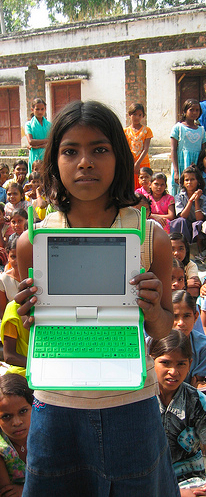Small is bigger than big for OLPC deployment
Via Morgan Collett we learn that OLPC is discontinuing it’s “small” deployment support of 100-1000 XO laptop purchases:<div style="float: right; margin-left: 10px; margin-bottom: 10px;">
Deployments should be any scale</div><blockquote>Unfortunately, as some of you might have heard “Change the World” aka “Give a School” aka “Give 100, Give 1000” will cease to exist. We are just waiting for the info to be taken off the main website (any second now). We are doing this in an effort to refocus back to large-scale deployments that create change in a major way. We WILL honor all requests that we have received prior to the info being taken off the website.</blockquote>
As I commented last night, this is ridiculous - why can’t OLPC perform remotely as well as every other computer manufacturer on the planet? Especially with a first-mover product with (for now) unmatched features.
I want 1-laptop deployments, 5-laptop deployments, and 10-laptop deployments. I really hope there’s a good reason why that’s not as easy as it seems. Here’s a business plan for selling laptops, the profits (if any) can go back into (re-)hiring and paying programmers, continuing R&D for the next generation OLPC XO-2, deployment personnel, and any excess could be offered as grants to create low-cost pilot projects or backstop community/peer support groups by defraying shipping costs and providing free parts.<ul><li>Sell 1 laptop for $300 - on par with the lower-end EeePCs. Anyone can buy one. Great.</li><li>Sell 10 laptops for $275 each, 100 for around $250, and so on , scaling down the per-unit price as the bulk purchase goes up. Kinda like the original plan to achieve massive scale, just taken down by a few powers of 10.</li><li>Sell support/installation services - separately. Make it clear that this is a needed service (which could be undertaken by independent contractors), and that there’s monetary value connected to it.</li></ul>
Clearly there are higher (per-unit) costs in small deployments, which is why you decouple the hardware from the support - if a school has some dedicated teachers who want to use a handful of XOs in a specific setting, they can do so without official support beyond the wiki and the XO community.
This decoupling step requires OLPC to change two unstated but fundamental beliefs - that the laptop does, in fact need on-the-ground deployment support to be successful, and that that expertise can come from people who aren’t part of OLPC. Letting a school purchase 10 XOs without a “support plan” means losing “control” of such smaller deployments, which OLPC seems reluctant to do, to put it mildly.
Regardless, if OLPC truly wants the XO to thrive as a device, and by extension, as a successful educational tool for the developing world, it cannot expect (or want) to puppetmaster each and every deployment with its already-strapped team.
If this sounds familiar, it’s because I’ve been calling for commercialization for a long time. Christoph also has an innovative approach on changing OLPC into a partially for-profit organization, by focusing on education instead of the technology,and other suggestions for OLPC remodeling, not to mention exciting news about the successes for the now-independent SugarLabs.
Most non-profits scrabble for anything they can monetize and roll back into funding operations, while OLPC seems to be sitting on gold and refusing to sell it. I feel like I must be missing something as to the why, and I’m hoping that it’s not just pure stubbornness.
